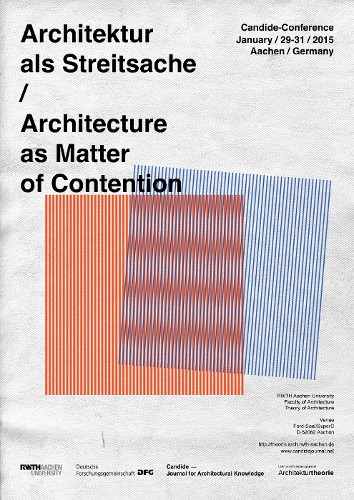Architecture as a matter of dispute

29 – 31 January 2015
Aachen, Germany
The complex relationship between architecture and conflict will be discussed at the conference “Architecture as a Matter of Dispute”. By considering architecture as a matter of dispute, it is possible for us to gain new knowledge about architectural objects and the interactions they entail. Architectural things, whether in the form of structural details, buildings or entire cities, are powerful actors in conflict-laden processes. Through and with them, the field of politics and the negotiation of law are constituted. They are politically operative in that they make conflicts visible and negotiable as interfaces. The disputes over Stuttgart 21, the Elbphilharmonie in Hamburg or Les Halles in Paris are current examples of the topic.
The aim of the conference is to broaden thinking about architecture to include perspectives from the fields of legal theory and political philosophy. As agencies of the political, objects of dispute make plurality and heterogeneous interests perceptible. The unconventionality of architecture opens up a new space for joint thinking and action.
The conference “Architecture as a Matter of Controversy” is interdisciplinary and is aimed at representatives from the fields of architecture, art studies, political sciences, law, cultural studies, anthropology, science and technology studies, cultural technology studies and media philosophy.
Disputes break out on the basis of sketches, plans, models, construction site protocols, cost balances, legal provisions and press releases. How and through which circumstances does architecture become a “bone of contention”? What exactly is the thing that is being argued about in each case? To what extent can the design process be understood as a concatenation and negotiation of differences between a wide variety of agencies, human and non-human? What architectural knowledge manifests itself in concrete dispute?
Disputes create their own social spaces. In them, contending community arises and thus the basic condition of the political. How do the contending actors make architecture their own? What changes does the dispute undergo in the conflictual relation? How do values become understandable and negotiable in a dispute? How do selection processes and judgement work in competitions? How do architectures become instruments for the resolution of conflicts?
Architectural disputes not only promote bellicose polemics, but also social knowledge that can be applied in processes of negotiation and arbitration. What function do architectures fulfil as carriers or testimonies of past conflicts? How can the knowledge gained from conflicts be used for conflict prevention strategies? Is it possible and meaningful to think of building culture as a culture of dispute?
